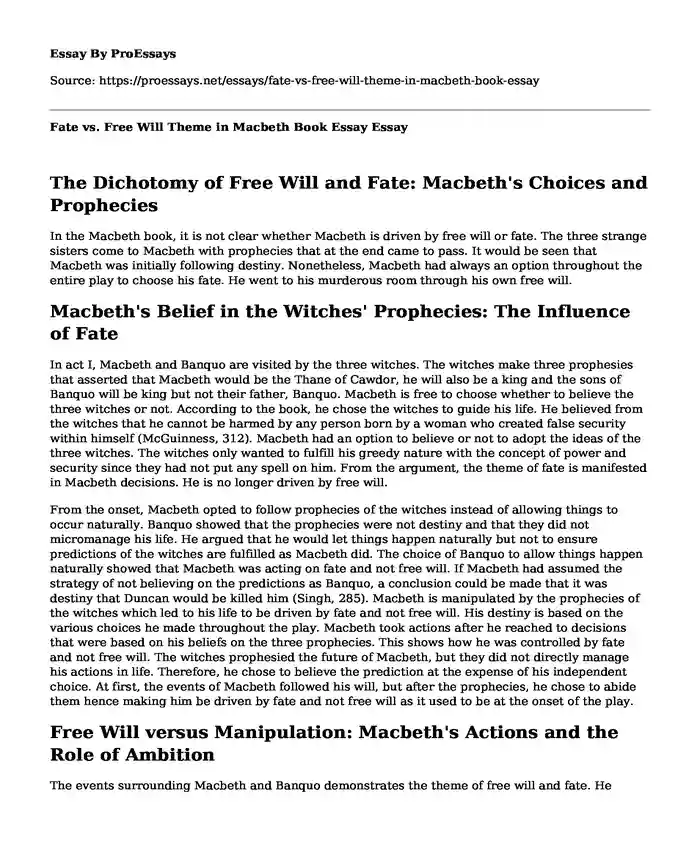The Dichotomy of Free Will and Fate: Macbeth's Choices and Prophecies
In the Macbeth book, it is not clear whether Macbeth is driven by free will or fate. The three strange sisters come to Macbeth with prophecies that at the end came to pass. It would be seen that Macbeth was initially following destiny. Nonetheless, Macbeth had always an option throughout the entire play to choose his fate. He went to his murderous room through his own free will.
Macbeth's Belief in the Witches' Prophecies: The Influence of Fate
In act I, Macbeth and Banquo are visited by the three witches. The witches make three prophesies that asserted that Macbeth would be the Thane of Cawdor, he will also be a king and the sons of Banquo will be king but not their father, Banquo. Macbeth is free to choose whether to believe the three witches or not. According to the book, he chose the witches to guide his life. He believed from the witches that he cannot be harmed by any person born by a woman who created false security within himself (McGuinness, 312). Macbeth had an option to believe or not to adopt the ideas of the three witches. The witches only wanted to fulfill his greedy nature with the concept of power and security since they had not put any spell on him. From the argument, the theme of fate is manifested in Macbeth decisions. He is no longer driven by free will.
From the onset, Macbeth opted to follow prophecies of the witches instead of allowing things to occur naturally. Banquo showed that the prophecies were not destiny and that they did not micromanage his life. He argued that he would let things happen naturally but not to ensure predictions of the witches are fulfilled as Macbeth did. The choice of Banquo to allow things happen naturally showed that Macbeth was acting on fate and not free will. If Macbeth had assumed the strategy of not believing on the predictions as Banquo, a conclusion could be made that it was destiny that Duncan would be killed him (Singh, 285). Macbeth is manipulated by the prophecies of the witches which led to his life to be driven by fate and not free will. His destiny is based on the various choices he made throughout the play. Macbeth took actions after he reached to decisions that were based on his beliefs on the three prophecies. This shows how he was controlled by fate and not free will. The witches prophesied the future of Macbeth, but they did not directly manage his actions in life. Therefore, he chose to believe the prediction at the expense of his independent choice. At first, the events of Macbeth followed his will, but after the prophecies, he chose to abide them hence making him be driven by fate and not free will as it used to be at the onset of the play.
Free Will versus Manipulation: Macbeth's Actions and the Role of Ambition
The events surrounding Macbeth and Banquo demonstrates the theme of free will and fate. He believes that he can kill Banquo and his son to assume powers as the king as predicted by the three witchdoctors. He would be acting out of free will and not fate to kill the duo. There were no external powers that would have forced Macbeth to kill the son of Banquo because the witches were fooling him. It was his selfish ambitions that made him base most of his decisions on fate, not free will.
Works Cited
McGuinness, Frank. "Madness and Magic: Shakespeare's Macbeth." Irish University Review 45.1 (2015): 69-80.
Singh, Prabhakar. "Macbeth's Three Witches: Capitalism, Common Good, and International Law." Or. Rev. Int'l L. 14 (2012): 47.
Cite this page
Fate vs. Free Will Theme in Macbeth Book Essay. (2022, Feb 22). Retrieved from https://proessays.net/essays/fate-vs-free-will-theme-in-macbeth-book-essay
If you are the original author of this essay and no longer wish to have it published on the ProEssays website, please click below to request its removal:
- Why It Is Important to Have a Manifesto
- Self-Acceptance in Children With Synesthesia: The Girl Who Heard Colors Essay
- Literary Analysis Essay Sample on Deliverance by James Dickey
- Ethics: The Five Basic Principles Essay Example
- To Kill a Mockingbird by Harper Lee: Citical Essay Sample
- Literary Analysis Essay on The Story of The Story of Hour by Kate Chopin
- Poetry Analysis Essay on My Last Duchess: The Persona's Characters







